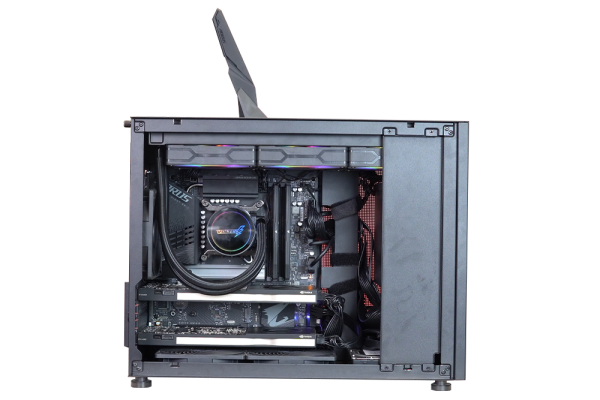
Gaming PC Security: How to Protect Your System from Cyber Threats in 2024
Gaming PC Security: How to Protect Your System from Cyber Threats in 2024
1: Understanding Cyber Threats to Gaming PCs
Introduction to the Rising Cyber Threats in Gaming
In recent years, the gaming industry has become a prime target for cybercriminals. With a growing number of gamers and the increasing value of digital assets such as in-game currencies, skins, and accounts, the stakes are higher than ever. As we head into 2024, it's essential for gamers to understand the various cyber threats they face and how to protect themselves.
Common Types of Cyber Threats:
- Malware:
Malware includes viruses, worms, Trojans, and spyware that can infect a gaming PC, steal data, damage files, or even hijack the system for nefarious purposes. - Ransomware:
Ransomware attacks are particularly damaging as they encrypt the victim's data, demanding payment in exchange for the decryption key. This can lead to significant losses, especially for gamers with valuable digital assets. - Phishing Attacks:
Phishing involves deceptive emails, messages, or websites designed to trick gamers into revealing personal information or account credentials. These attacks can result in account takeovers and financial losses.
The Impact of Cyber Threats on Gamers
Cyber threats can lead to various negative outcomes for gamers, including compromised accounts, loss of in-game items, financial fraud, and even identity theft. The emotional and financial toll of these incidents can be substantial, emphasizing the need for robust security measures.
Overview of Notable Cyber Incidents in Gaming
The gaming industry has witnessed several high-profile cyber incidents. For instance, in 2023, a major gaming platform was targeted by a phishing attack that resulted in the compromise of thousands of accounts. In another incident, a popular online game was hit by a ransomware attack, causing significant disruptions to its player base.
2: Essential Security Practices for Gaming PC Users
Introduction to Basic Security Postures
Adopting a proactive approach to cybersecurity is crucial for gaming PC users. By implementing essential security practices, gamers can significantly reduce their risk of falling victim to cyber threats.
Keep Software and Operating Systems Updated
Regularly updating your gaming PC's software and operating systems is one of the most effective ways to protect against cyber threats. Updates often include security patches that address known vulnerabilities, making it harder for attackers to exploit your system.
Utilize Strong, Unique Passwords
Using strong, unique passwords for each gaming account is vital. Avoid common passwords and consider using a reputable password manager to generate and store complex passwords securely.
Importance of Enabling Two-Factor Authentication
Two-factor authentication (2FA) adds an extra layer of security to your gaming accounts. By requiring a second form of verification, such as a code sent to your mobile device, 2FA makes it significantly more difficult for unauthorized users to access your accounts.
Regular Backups of Important Data
Regularly backing up your important data, including game saves and personal files, ensures that you can recover quickly in the event of a cyberattack or hardware failure. Consider using cloud storage or an external hard drive for backups.
3: Picking the Right Security Software
Introduction to Security Solutions for Gamers
Selecting the right security software is essential for protecting your gaming PC from cyber threats. With numerous options available, it's important to choose solutions that offer comprehensive protection without compromising system performance.
Recommended Antivirus and Anti-Malware Programs
When choosing antivirus and anti-malware programs, look for solutions that provide real-time protection, automatic updates, and robust scanning capabilities. Some of the top-rated programs for gamers include Bitdefender, Norton, and Kaspersky.
Importance of Firewalls
Firewalls act as a barrier between your gaming PC and potential threats, monitoring and controlling incoming and outgoing network traffic. Ensure your firewall is enabled and properly configured to protect against unauthorized access.
Benefits of Using VPNs While Gaming
A Virtual Private Network (VPN) encrypts your internet connection, protecting your data from hackers and eavesdroppers. VPNs also allow you to bypass geographical restrictions and reduce the risk of Distributed Denial of Service (DDoS) attacks.
Evaluating Free vs. Paid Security Software
While free security software can offer basic protection, paid solutions generally provide more comprehensive coverage and additional features such as advanced threat detection, identity theft protection, and customer support. Evaluate your needs and consider investing in a paid solution for optimal security.
4: Safe Online Gaming Practices
Introduction to Safe Gaming Habits
Practicing safe online gaming habits is essential for protecting your gaming PC and personal information from cyber threats. By following a few simple guidelines, gamers can enjoy a safer gaming experience.
Avoiding Public Wi-Fi for Gaming
Public Wi-Fi networks are often unsecured, making them a prime target for hackers. Avoid using public Wi-Fi for gaming, and if you must, use a VPN to encrypt your connection and protect your data.
Be Wary of In-Game Links and Downloads
In-game links and downloads can be a source of malware and other threats. Only download content from trusted sources and be cautious when clicking on links or accepting files from other players.
Strategies for Secure Online Multiplayer Gaming
When playing online multiplayer games, use privacy settings to control who can contact you and what information is visible to others. Be cautious about sharing personal information with other players and report any suspicious activity or harassment.
Reporting and Avoiding Toxic Gaming Communities
Toxic gaming communities can be a breeding ground for cyber threats and harassment. Avoid engaging with toxic players and report any abusive behavior to game moderators or support teams.
5: Social Engineering and Phishing in Gaming
Understanding Social Engineering Tactics
Social engineering tactics involve manipulating individuals into divulging confidential information or performing actions that compromise security. Gamers should be aware of these tactics and learn how to recognize and avoid them.
Identifying Phishing Scams Targeting Gamers
Phishing scams often target gamers through emails, messages, or websites that appear to be from legitimate sources. Be vigilant and verify the authenticity of any communication before clicking on links or providing personal information.
How to Safeguard Personal Information Online
Protecting your personal information online is crucial for maintaining your privacy and security. Avoid sharing sensitive information such as your full name, address, or financial details in gaming forums or chats.
Importance of Educating the Gaming Community
Educating the gaming community about cybersecurity risks and best practices can help create a safer online environment for everyone. Share your knowledge and encourage others to follow safe gaming habits.
Immediate Steps to Take if Phishing is Suspected
If you suspect a phishing attempt, do not respond or provide any information. Report the incident to the appropriate authorities and change your passwords immediately.
6: Protecting Personal Information and Accounts
Introduction to Data Privacy Concerns
Data privacy is a growing concern for gamers, as cybercriminals often target gaming accounts and personal information for financial gain. Taking steps to protect your data is essential for maintaining your security and privacy.
Importance of Securing Gaming Accounts (Steam, Epic Games, etc.)
Securing your gaming accounts is critical for protecting your digital assets and personal information. Enable 2FA, use strong passwords, and regularly review your account settings to ensure maximum security.
Features to Use for Account Protection
Many gaming platforms offer features such as login notifications, account activity logs, and session management tools. Utilize these features to monitor your accounts and detect any suspicious activity.
Risks of Third-Party Gaming Tools and Plugins
Third-party gaming tools and plugins can enhance your gaming experience but also pose security risks. Only use tools and plugins from trusted sources and be cautious about granting permissions or sharing personal information.
Dealing with Account Takeovers
If your gaming account is compromised, take immediate action to secure your account and prevent further damage. Change your passwords, enable 2FA, and contact the platform's support team for assistance.
7: Securing Your Home Network for Gaming Safety
Introduction to Home Network Security
Securing your home network is an important step in protecting your gaming PC and other connected devices from cyber threats. By implementing a few simple measures, you can enhance the security of your home network.
Importance of Changing Default Router Settings
Many routers come with default settings that are easily exploited by hackers. Change your router's default username and password, and disable any unnecessary features to reduce potential vulnerabilities.
Setting Up a Guest Network
A guest network allows you to provide internet access to visitors without granting them access to your main network. This can help protect your gaming PC and other devices from potential threats.
Enabling WPA3 Encryption
WPA3 is the latest Wi-Fi security protocol and provides stronger encryption and better protection against attacks. Ensure your router is configured to use WPA3 encryption for optimal security.
Regularly Updating Router Firmware
Router firmware updates often include security patches and performance improvements. Regularly check for and install firmware updates to keep your router secure and functioning properly.
8: Responding to Cyber Incidents
What to Do if Your Gaming PC is Compromised
If your gaming PC is compromised, it's important to take immediate action to mitigate the damage and protect your data. Disconnect your PC from the internet, run a full system scan with your antivirus software, and change your passwords.
Steps for Isolating and Analyzing the Breach
Isolating and analyzing the breach can help you understand how the compromise occurred and what steps you can take to prevent future incidents. Consult with a cybersecurity professional if necessary.
How to Recover from Ransomware Attacks
Recovering from a ransomware attack can be challenging, but it's important to stay calm and follow best practices. Do not pay the ransom, as this only encourages further attacks. Instead, restore your data from backups and seek assistance from cybersecurity experts.
Importance of Reporting Cyber Crimes
Reporting cyber crimes is essential for helping authorities track down and prosecute cybercriminals. Contact your local law enforcement agency or a cybersecurity organization to report any incidents.
Preventative Measures for the Future
Taking preventative measures, such as implementing strong security practices and staying informed about the latest cyber threats, can help protect your gaming PC and personal information from future attacks.
9: Future Trends in Gaming Security
Overview of Emerging Cyber Threats
As technology continues to evolve, so do the tactics of cybercriminals. Emerging threats such as deepfakes, AI-powered attacks, and new forms of malware pose significant challenges for gamers and security professionals alike.
Innovations in Gaming Security Technology
The gaming industry is continually developing new technologies to combat cyber threats. Innovations such as AI-driven threat detection, blockchain-based security solutions, and advanced encryption methods are helping to create a safer gaming environment.
Role of AI in Threat Detection and Prevention
AI plays a crucial role in detecting and preventing cyber threats. By analyzing patterns and behaviors, AI can identify potential threats and respond in real time, enhancing the overall security of gaming systems.
The Importance of Consumer Awareness in Security
Consumer awareness is a key factor in preventing cyber threats. By staying informed about the latest security trends and best practices, gamers can take proactive steps to protect themselves and their systems.
How Developers Can Contribute to Safer Gaming Environments
Game developers can play a significant role in creating safer gaming environments by implementing robust security measures, educating players about cybersecurity risks, and promoting safe gaming practices.
10: Building a Security-Conscious Gaming Community
Introduction to Cybersecurity Education in Gaming
Cybersecurity education is essential for building a security-conscious gaming community. By sharing knowledge and resources, gamers can learn how to protect themselves and others from cyber threats.
Importance of Community Guidelines for Engagement
Establishing clear community guidelines for engagement can help create a positive and secure gaming environment. Encourage respectful behavior, report violations, and promote safe gaming practices among community members.
Resources for Gamers to Stay Informed
There are numerous resources available for gamers to stay informed about cybersecurity threats and best practices. Websites, forums, and online communities dedicated to gaming security can provide valuable information and support.
Rallying Together Against Cyber Threats
By rallying together and sharing information, gamers can help protect each other from cyber threats. Participate in community discussions, report suspicious activity, and support initiatives aimed at enhancing gaming security.
Conclusion: Building a Safer Gaming Future
As the gaming industry continues to grow, so does the need for robust cybersecurity measures. By staying informed, adopting safe gaming practices, and working together as a community, gamers can help build a safer gaming future for everyone
Posted 1 year agoby Armaan











